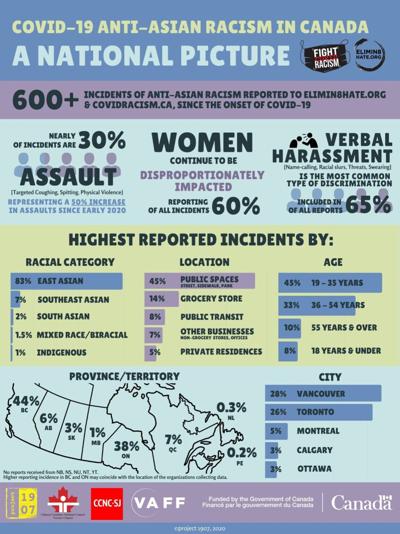One coronavirus case in Ontario is all it took at the start of 2020 for anti-Asian racist attitudes to run rampant.
By the time the pandemic was declared in mid-March, Markham restaurant Wuhan Noodle 1950 had already experienced months of racist comments on social media and prank phone calls falsely linking the business and its owners to the virus and threatening their livelihood.
“The social media comments said we sell bat soup and we were spreading coronavirus … they asked me to shut down,” restaurant owner Zhengyu Fang said, adding that they were receiving about 20 prank phone calls a day.
Fang made the decision to speak out and counter the racist comments and harassment, making local headlines and garnering support from residents and community leaders alike.
While he and his family no longer feel threatened, Fang said he knows that is not the case for many Asian-run businesses. Anyone experiencing acts of racism, said Fang, should speak out against it.
The Chinese Canadian National Council for Social Justice (CCNC-SJ) — in partnership with the Chinese Canadian National Council's Toronto chapter, the Chinese and Southeast Asian Legal Clinic, the Civic Engagement Network and grassroots advocacy group Project 1907 — continues to collect COVID-related reports of anti-Asian racism and xenophobia across Canada through online incident reporting centres at covidracism.ca and elimin8hate.org.
As of March 2021, more than 800 racist incidents have been reported, including hate messages and individual attacks — many in public places, such as grocery stores and out on the street.

Statistics from a national report on anti-Asian racism by Fight COVID Racism and Elimin8 Hate in September are displayed in an infographic.
— Project 1907 infographic from September 2020
Nearly 30 per cent of 600 incidents reported between April and September 2020 involved assault, including targeted coughing, spitting and physical attacks, while 65 per cent involved verbal assault. Women were the victims in 60 per cent of reported cases, and Ontario had the second highest concentration of reports after British Columbia.
Avvy Go is a Chinese-Canadian lawyer and the director of the Chinese and Southeast Asian Legal Clinic in Toronto.
She said that although the pandemic has fanned the flames of anti-Asian racism since Canada's first COVID-19 case, this country has a long-standing history of discrimination against East and Southeast Asian communities, going back to when the first Chinese workers arrived on the west coast to participate in the fur trade there in 1788.
Go believes short- and long-term solutions to anti-Asian racism need to start with action at the individual and community levels and within all three levels of government. Individuals who want to be part of the solution need to commit to fighting for racial justice and equity for everyone, she said, not just for one racialized community.
"The underpinning principle is the same; it is to get rid of white supremacy, ensure everyone lives with equal dignity and is afforded equal opportunities to succeed," she said.
Go noted the federal government failed to acknowledge anti-Asian racism in its Anti-Racism Strategy 2019-2022.
Some MPs in Ontario, including Conservative Markham MP Bob Saroya and Liberal Oakville MP Pam Damoff, have made efforts in the last year to consult Chinese- and Southeast Asian-led community groups in their ridings on ways to fight racism. However, Damoff admits the federal government has, to some extent, overlooked Asian communities in its recent anti-racism strategies.
"I know the (prime minister) and other MPs have spoken out against anti-Asian racism, but it certainly hasn’t been the focus of a lot of conversations, probably because the systemic issues we were talking about impact Indigenous and Black people more," Damoff said. “I think it’s a fair point that we could be doing more to call it out."
Saroya said he views anti-Asian racism not as a partisan issue but as a human issue that all parties and levels of government have a responsibility to address.
“If we don't acknowledge it, that means we’re not doing anything. Acknowledging it is the starting point, then taking action," he said.



 Report an error
Report an error Journalistic Standards
Journalistic Standards










